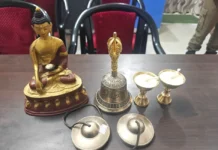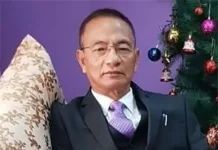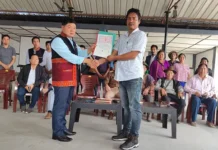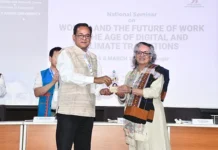Staff Reporter
ITANAGAR, Feb 21: The All Arunachal Pradesh Students’ Union (AAPSU) on Thursday clarified the misconception regarding its stand on the permanent resident certificate (PRC) issue during the last joint high power committee (JHPC) meeting, and said the primary precondition for granting PRCs was that it would be used only for educational and employment purposes by families recorded in the cadastral survey of 1968, and that PRCs would not grant the non-APSTs rights at par with the APSTs.
Addressing reporters at Arunachal Press Club here, AAPSU president Hawa Bagang said as the non-APSTs have requested for PRCs for educational and employment purposes, “it will only be used for that, and having PRCs will not grant them APST quota in jobs.”
Referring to the bandh imposed by a conglomeration of organisations, Bagang said, “Though everyone has the right to take up democratic means to get their voices heard, it is also important to know the depth of the issue before protesting and creating law and order problems.”
He said “former JHPC chairman, late Jarbom Gamlin, in his report had clearly said that PRCs should be granted. Another JHPC was constituted under former MP and current APCC president, Takam Sanjoy. His report also said that PRCs should be granted. The current JHPC under Nabam Rebia also suggests the same.”
Bagang said there were a total of eight JHPC meetings, and that during the 7th JHPC meeting, the AAPSU had asked all the indigenous people of the immediately affected areas as to whom the land belonged. He said they had “all admitted that it was of the non-APSTs residing there,” and had suggested granting PRCs with the precondition that the indigenous rights would not be trampled upon.
Clarifying on the claims that PRCs would be seen as regular passes under Section 2 and 4 of the Bengal Eastern Frontier Regulation (BEFR) Act of 1873 and would result in its (BEFR) modification, Bagang informed that these sections allow the state government to extend or reduce the extent of the BEFR in the state, and do not modify the BEFR in any way.
“It means that ILP is not limited only to the boundaries of Arunachal, and the state government has the right to extend it within the state, as well. Which is why we suggested creating police check posts in the demarcated APST and non-APST lands, so that even genuine non-APST PRC holders would have to acquire ILPs to enter into APST land,” he said.
Also stating that “ILPs for residents are rarely checked in Mahadevpur (Lekang check gate),” Bagang said he was positive that this precondition would now require them to show ILPs.
“Those who are claiming that the BEFR has been compromised with are not even aware what these sections imply,” he said, adding: “We are clear that we will not agree to PRCs being issued as ILPs.”
The AAPSU president informed that the union had suggested having stringent law enforcement to check unlawful activities in the areas on the apprehension that some may attempt to get their names in illegally in the 1968 dossier.
It may be mentioned here that the non-APSTs of Namsai had during a protest rally said they were not keen on making a new dossier as the state government already has the records of 1968.
Further, the AAPSU said it wants an accord among the state government, the AAPSU and the non-APSTs of Lekang and Bordumsa circles to maintain an understanding.
The AAPSU also set several other preconditions, which include proper survey and identification of non-APSTS in the districts; preparation of family trees according to the cadastral survey of 1968; proper demarcation of non-APST inhabited areas, suggesting that no non-APST should be allowed to own land or other property in the areas inhabited by indigenous people; not dragging the issue of PRCs to court after its issuance for tribal rights; keeping distinction between the rights of the APSTs and the non-APSTs; making ILPs mandatory with PRCs to enter into APST land; not making PRCs a basis for claiming APST rights in the near future, for which they will have to sign an agreement; debarring APSTs from acquiring any immovable property in APST areas; cancelling the PRCs in the event of any violation of the conditions; ensuring that the clause does not affect, contradict, or contravene the BEFR 1873, etc.
“If it affects the BEFR in any way, we will not accept it,” he said.
However, the AAPSU said it was against issuance of PRCs to the Gorkhas and ex-servicemen of Vijoynagar in Changlang district as they were settled on lease and were paying rent for staying in Yobin land.
The extended lease of the Gorkhas and ex-servicemen ends in 2020.
During the last JHPC meeting, Bagang said, the AAPSU had enquired whether anyone had any objections made in the recommendations.
“No one raised any objections, except a few, like the Peoples’ Party of Arunachal’s chairman Kamen Ringu, who suggested that all the non-APSTs scattered in Diyun and Lekang should be settled in one place before going ahead with the JHPC report. But it was not a plausible idea and was not taken up. APPDSU president Nabam Tado suggested adding more elaborate points, but did not move ahead. While we opposed granting PRCs to Gorkhas, the All Tangsa Students’ Union president suggested settling them in a demarcated land. The All Tai Khampti Singpho Students’ Union, the All Namsai District Students’ Union and the Changlang District Students’ Union also did not raise any objections then. No one said a word against the recommendations. Everything was recorded during the JHPC meet. Why not give it to the media, so that everything comes out in the open for the people to judge?” he said.
Additionally, the state government suggested introducing biometrics of genuine non-APSTs. Voter identification cards will also not be accepted as proof to avail PRCs.
“All of it was applicable only for Namsai and Changlang districts as there was no issue in Lohit district regarding PRCs, while the Mikirs of Papum Pare are seeking APST status, which becomes an entirely different issue,” Bagang said.
Earlier, APPSDU president Nabam Tado had suggested granting APST status to genuine Karbis/Mikirs settled in the plains of Arunachal.
AAPSU general secretary Tobom Dai also said that “the full story of the PRC issue is not being fed to the public by our student friends.”
“People have to be aware that the PRC demand is not for all non-APSTs residing in the state. It is only for those who have been residing in the mentioned lands of Arunachal since time immemorial,” Dai said, adding that “it is not their fault. When the Bordoloi Commission reorganized the land of Assam and Arunachal, they came under the administration of the Arunachal government.”
He admitted that the AAPSU had in 2008 opposed the granting of PRCs, but they were now aware of the ground reality after being part of the JHPC.
“We want to end the issue as it becomes a political issue each time,” he added.
Meanwhile, the AAPSU held a meeting on Wednesday and resolved to take strong disciplinary action against its federal units for bypassing the rule that they (the federal units) would not take any decision or formulate any policy the action of which concerns more than two districts, without the prior approval of the executive council of the AAPSU.




